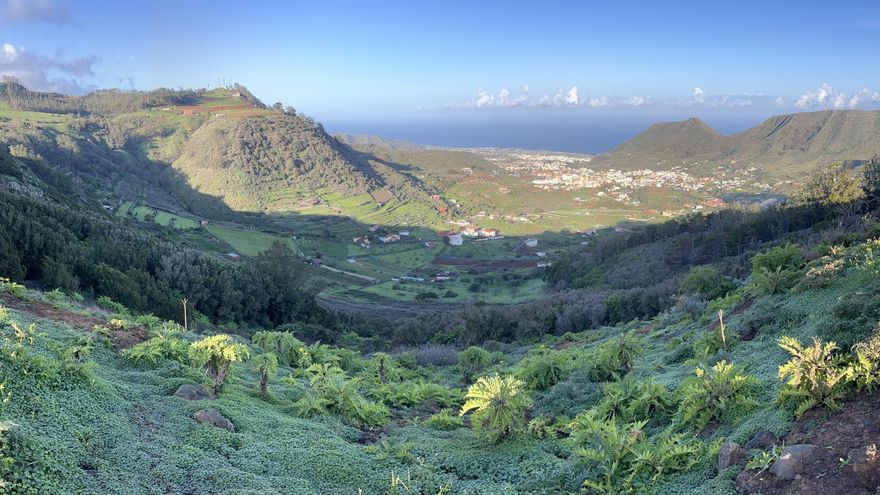
A project encompassing approximately 4 kilometres of piping, with a 350-metre positive slope (ranging from 350 to 700 metres above sea level) and a projected cost of two million euros, is being financed by the Ministry of Agriculture of the Government of the Canary Islands. The management will be entrusted to the Balsas de Tenerife (Balten) entity, overseen by the Cabildo. This initiative aims to enhance the utilisation of regenerated water, sourced from the Expanded Treatment Plant in Buenos Aires located in Santa Cruz, extending from the Valle Molina reservoir in Teguesete to the pond serving the Las Peñuelas community at the Mota Mesa (La Laguna). This initiative is a crucial measure to address the drought challenges affecting the island, which led to the declaration of a water emergency in the first half of the previous year, particularly impacting the Medianías of the Northeast region (War Valley, Tejina, Tegueste, and Tacoronte).
The Agricultural Medianías de Tegueste elaborated on the situation, noting that prior to the cessation of the Pozo Los Laurels pump several years ago, alternative irrigation water sources had to be explored. The chosen solution is to use regenerated water. The Molina to Peñuelas project is identified as number 33 within the Emergency Actions Plan under the Institutional Agreement for the Water Emergency Declaration on the Island of Tenerife, dated March 1, 2024.
Background
Since February 2021, the Cabildo de Tenerife has sought project proposals and endorsed the concept of directly supplying irrigation water from the Balsa de Valle Molina to the pond serving the Las Peñuelas irrigation community at the Mota Mesa. Following several years and a change in the island’s government, in May 2023, the initiative reached completion. The Minister of Agriculture for the Government of the Canary Islands, Narvay Quintero, has committed to financing this project, with the expectation of handing over the infrastructure to the island corporation within 18 months of its completion.
Procedures
The project must navigate a series of bureaucratic processes involving consultations and approvals from various bodies such as Carreteras, the Insular Water Council of Tenerife (CIATF), and local councils, along with the necessary documentation from the relevant authorities. Upon approval, it will be made available for public inspection. This process includes securing the agreements for the private lands through which the proposed pipeline will run. Once finalised, the agreement between the council and the advising body will be prepared for the subsequent tendering of the work, with an estimated total timeframe of a year and a half.
Prospects
This initiative not only offers hope for the future of agriculture in Tenerife but also aims to channel roughly 3,000 m³/day towards the island’s northeast region, supplementing the current capacity of 25,000 m³/day. The responsibility for this undertaking lies with the State, although it has faced delays since June 2022, with the expected completion date set for December of this year.
Scope
This effort corresponds to measure 39.1 identified in the Declaration of Water Emergency for Tenerife, issued by the Insular Water Council on May 29, 2024: «Tertiary treatment via reversible electrodialysis at the WWTP in Buenos Aires». It aims to enhance the treatment capacity by an additional 21,000 m³/day in wastewater purification, with subsequent transportation via the network to areas in the south of the island.
Flow Rate
The projected flow rate intends to direct 3,000 m³/day to the sewage station (EDAS) of El Chorrillo through pumping. Following this, the resulting desalinised water—approximately half, or 1,500 m³/day—will be routed to a tunnel situated in Valle Tabares, destined for the Balsa de Valle Molina and the Boquerón in the Northeast Region. This is planned for completion by February, as indicated in the declaration.
Evaluation
Farmers consulted have expressed that: «Regenerated water will be essential for reinvigorating agriculture in the Medianías. Repurposing treated wastewater will enable this area to regain its historical agricultural prominence.» They further emphasised the urgency: “It is imperative to advance this project as the ongoing declaration allows for expedited processing of the necessary actions.” Farmers concluded with a remark of concern: “It is unacceptable that we have not convened the drought committee for three months.”
















